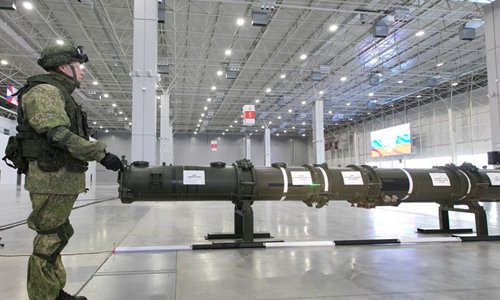A day before INF Treaty expires, US, Russia urged to seek new path for arms control

The 9M728 missile container is demonstrated at the Patriot Congress and Exhibition Center, outside Moscow, Russia, on Jan. 23, 2019. (Xinhua/Bai Xueqi)
"When it [INF Treaty] expires tomorrow, the world will lose an invaluable brake on nuclear war. This will likely heighten, not reduce, the threat posed by ballistic missiles," Antonio Guterres said.
UN Secretary-General Antonio Guterres on Thursday urged the United States and Russia to urgently seek agreement on "a new common path" for international arms control, a day before their Intermediate-Range Nuclear Forces (INF) Treaty expires.
At a press encounter, Guterres lauded the INF Treaty as a landmark agreement that helped stabilize Europe and end the Cold War.
"When it expires tomorrow, the world will lose an invaluable brake on nuclear war. This will likely heighten, not reduce, the threat posed by ballistic missiles," he said.
Regardless of what transpires, he said, the parties should avoid destabilizing developments and urgently seek agreement on a new common path for international arms control.
In early July, Russian President Vladimir Putin signed a bill into law, suspending the country's participation in the INF Treaty.
The decision was made in response to the United States' withdrawal from the key arms-control pact, which was signed by the Soviet Union and the United States in 1987.
The United States' withdrawal will be effective on Aug. 2, six months after Washington announced its intention to suspend its treaty obligations.
The INF Treaty requires the United States and Russia to eliminate and permanently forswear all of their nuclear and conventional ground-launched ballistic and cruise missiles with ranges of 500 to 5,500 km.
Moscow and Washington have accused each other of violating the agreement in recent years amid increasing tensions.